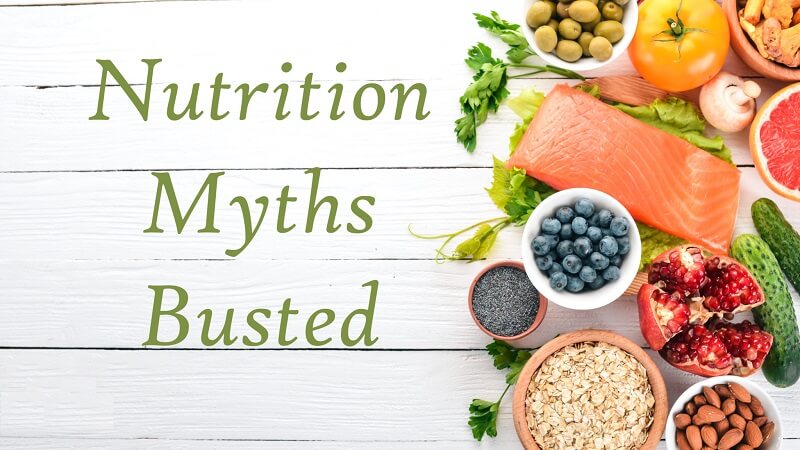Nutrition Myths You Should Not Believe
Looking through online media, or magazines, nourishment and wellbeing are the fields that are vastly mistaken.
Indeed, even qualified wellbeing experts, including specialists and dietitians, are to be faulted for spreading falsehood and myths related to healthy nutrition.
Here are 10 of the common nutrition myths debunked. Let’s check out.
Nutrition Myths and Facts
-
Myths: Breakfast is the main part of the day
While it was once felt that having breakfast was quite possibly the main element in setting yourself up for a sound day.
But research has shown that this probably won’t be the situation for most grown-ups.
Also, participating in irregular fasting, during which breakfast is either skipped or burned through later in the day.
However, intermittent fasting can additionally be refined by devouring a standard breakfast at that point having your last dinner prior in the evening to keep a fasting window of 14–16 hours.
-
Myths: White potatoes are not healthy to eat
While eating a lot of any food including white potatoes, you can probably acquire weight.
White potatoes are an incredible pack of numerous supplements, including potassium, nutrient C, and fiber.
Besides, they are more filling than other carb sources like rice and pasta and can help you feel more fulfilled after suppers.
-
Myths: Supplements are useless
A well-adjusted diet is the most fundamental segment of wellbeing.
But supplements, when utilized accurately and in the correct form, can be advantageous from various perspectives.
For some, particularly those with ailments like sort 2 diabetes, just as the individuals who take basic meds like statins, proton siphon inhibitors, conception prevention, and antidiabetic meds, taking good health supplements can fundamentally influence their wellbeing.
-
Myths: You must be thin to be fit
In any case, decreasing your illness doesn’t mean you need to be thin. What’s most significant is devouring a nutritious eating regimen and keeping a functioning way of life, as these practices frequently improve your body weight and body fat rate.
-
Myths: All smoothies and juices are sound
Certain juices and smoothies are exceptionally nutritious.
However, it’s essential to realize that most juices and smoothies sold at stores are stacked with sugar and calories.
At the point when consumed in abundance, they can promote weight gain and other medical problems.
-
Myths: Weight reduction is simple
Try not to be tricked by the emotional before and pictures of people.
Weight loss isn’t simple. It requires consistency, confidence, difficult work, and tolerance.
Furthermore, hereditary qualities and different elements make weight reduction a lot harder for some than others.
The best activity is to muffle the weight reduction commotion that you are presented consistently and track down a supporting and manageable dietary routine.
-
Myths: Cholesterol food varieties are unhealthy
Cholesterol-rich foods have gotten negative criticism because of misguided judgments about what cholesterol means for heart wellbeing.
While a few groups are more delicate to cholesterol than others, generally, supplement thick, cholesterol-rich food varieties can be remembered for a sound eating routine.
Truth be told, including cholesterol-rich, nutritious food sources like eggs and full-fat yogurt in your eating regimen may help in uplifting your health.
-
Myths: Macronutrient proportion matters more than diet quality
Some may persuade that the proportion of macronutrients in your eating routine is the only thing that is important with regards to weight reduction.
But, this extreme interpretation of nourishment is not right.
While having macronutrients can advantage, well-being from multiple points of view, the main factor in any eating routine is the nature of the food sources you eat.
-
Myths: Calcium supplements are fundamental for bone health
Numerous individuals are advised to take calcium supplements to keep their skeletal framework sound.
A few investigations have connected calcium supplements to an expanded danger of coronary illness.
Furthermore, research shows that they don’t diminish the danger of break or osteoporosis.
In case you are worried about your calcium consumption, it’s ideal to depend on dietary sources of calcium like full-fat yogurt, sardines, beans, and seeds.
-
Myths: Fiber supplements are a decent substitute for high fiber food sources
Numerous individuals battle with getting sufficient dietary fiber, which is the reason fiber supplements are so important.
High fiber entire foods like vegetables, beans, and organic products contain supplements and plant extracts that work to promote wellbeing, and they can’t be supplanted by fiber supplements.
Conclusion: Myths About Nutrition
These are nutrition controversies 2021 and are quite common. You probably have heard these and got confused about what is right and what is wrong!
But here we have debunked false nutrition facts and now you have got the right answers to your doubts.
